Research Report: Knowledge Management at FlightCentre (MNG93218)
VerifiedAdded on 2022/10/01
|29
|11573
|339
Report
AI Summary
This research report investigates the causes of poor knowledge management practices at FlightCentre Travel Group (FCTG), a major global travel agency. The study, conducted for a Master's in Information Technology Management, examines the issue of customer complaints stemming from insufficient knowledge of travel destinations among FlightCentre consultants. The report identifies key factors contributing to the problem, including ineffective knowledge sharing, lack of rewards for knowledge sharing, inadequate technology for knowledge management, and organizational structure and culture. The research employs a mixed-method approach, combining quantitative surveys and qualitative data analysis, to explore these factors and their impact on customer service. The findings highlight specific areas for improvement within FlightCentre, aiming to reduce customer complaints, improve customer retention, and enhance overall business performance. The report includes a detailed literature review, methodology section, findings, discussion, recommendations, and limitations, providing a comprehensive analysis of the challenges and potential solutions for effective knowledge management within the organization.
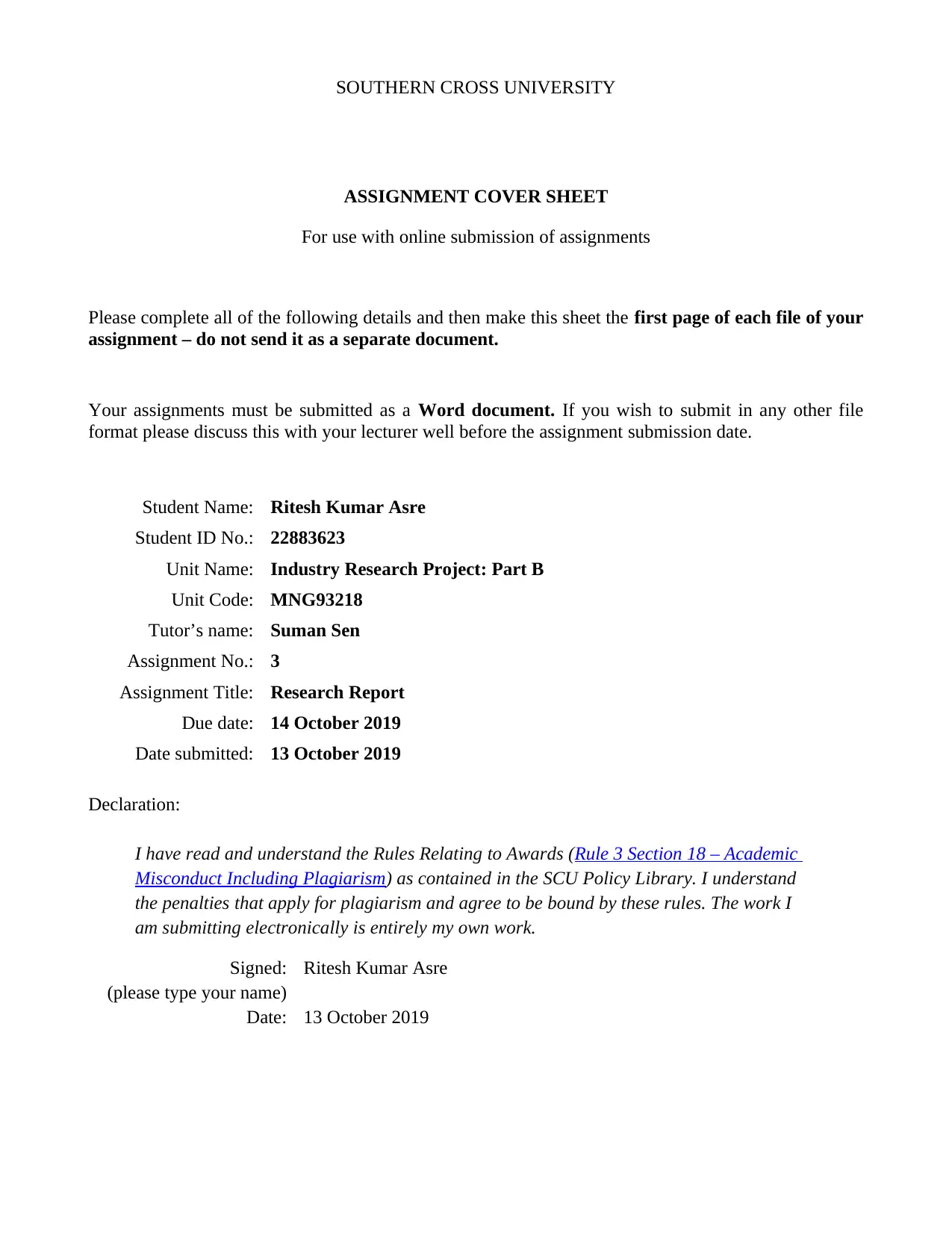
SOUTHERN CROSS UNIVERSITY
ASSIGNMENT COVER SHEET
For use with online submission of assignments
Please complete all of the following details and then make this sheet the first page of each file of your
assignment – do not send it as a separate document.
Your assignments must be submitted as a Word document. If you wish to submit in any other file
format please discuss this with your lecturer well before the assignment submission date.
Student Name: Ritesh Kumar Asre
Student ID No.: 22883623
Unit Name: Industry Research Project: Part B
Unit Code: MNG93218
Tutor’s name: Suman Sen
Assignment No.: 3
Assignment Title: Research Report
Due date: 14 October 2019
Date submitted: 13 October 2019
Declaration:
I have read and understand the Rules Relating to Awards (Rule 3 Section 18 – Academic
Misconduct Including Plagiarism) as contained in the SCU Policy Library. I understand
the penalties that apply for plagiarism and agree to be bound by these rules. The work I
am submitting electronically is entirely my own work.
Signed:
(please type your name)
Ritesh Kumar Asre
Date: 13 October 2019
ASSIGNMENT COVER SHEET
For use with online submission of assignments
Please complete all of the following details and then make this sheet the first page of each file of your
assignment – do not send it as a separate document.
Your assignments must be submitted as a Word document. If you wish to submit in any other file
format please discuss this with your lecturer well before the assignment submission date.
Student Name: Ritesh Kumar Asre
Student ID No.: 22883623
Unit Name: Industry Research Project: Part B
Unit Code: MNG93218
Tutor’s name: Suman Sen
Assignment No.: 3
Assignment Title: Research Report
Due date: 14 October 2019
Date submitted: 13 October 2019
Declaration:
I have read and understand the Rules Relating to Awards (Rule 3 Section 18 – Academic
Misconduct Including Plagiarism) as contained in the SCU Policy Library. I understand
the penalties that apply for plagiarism and agree to be bound by these rules. The work I
am submitting electronically is entirely my own work.
Signed:
(please type your name)
Ritesh Kumar Asre
Date: 13 October 2019
Paraphrase This Document
Need a fresh take? Get an instant paraphrase of this document with our AI Paraphraser
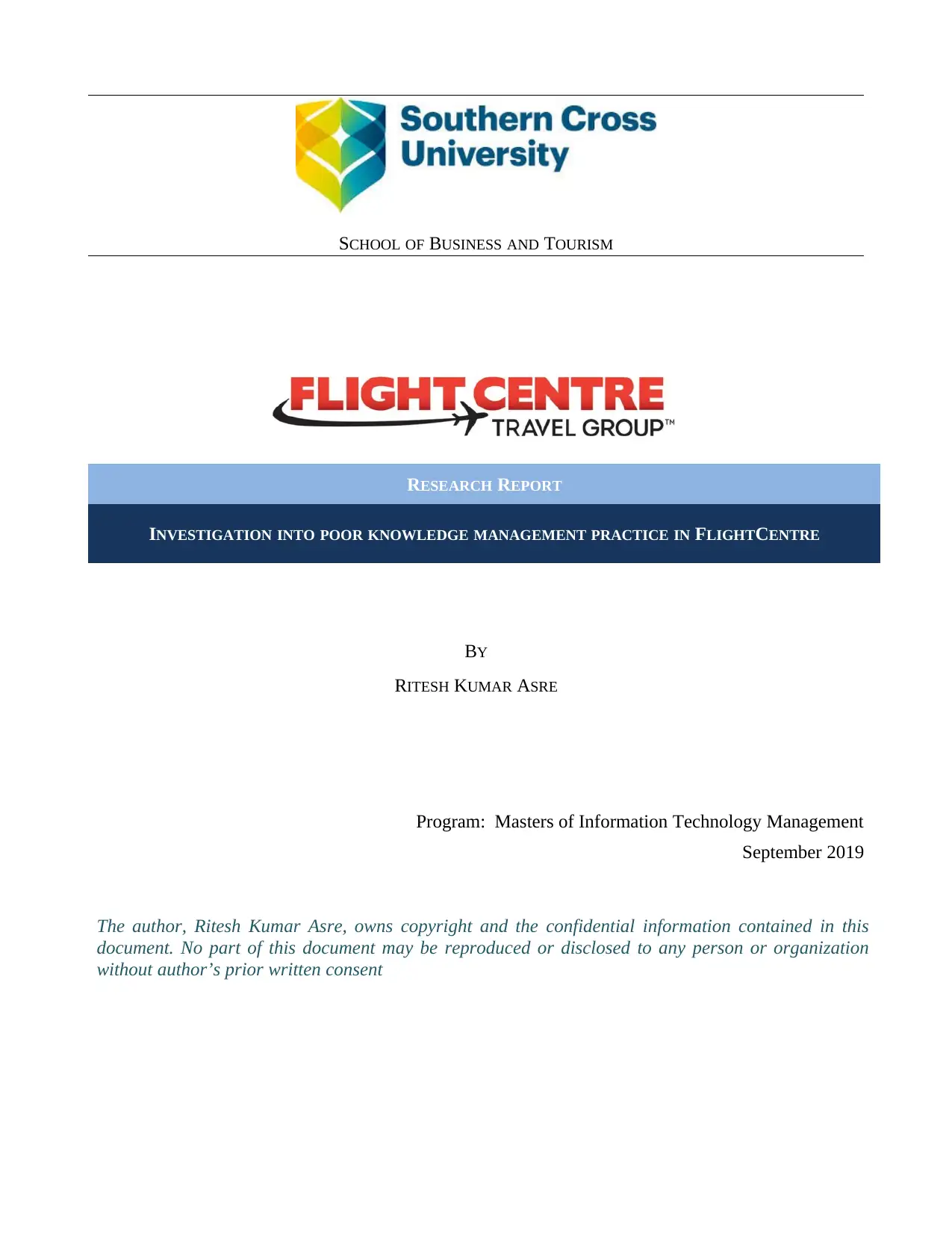
SCHOOL OF BUSINESS AND TOURISM
RESEARCH REPORT
INVESTIGATION INTO POOR KNOWLEDGE MANAGEMENT PRACTICE IN FLIGHTCENTRE
BY
RITESH KUMAR ASRE
Program: Masters of Information Technology Management
September 2019
The author, Ritesh Kumar Asre, owns copyright and the confidential information contained in this
document. No part of this document may be reproduced or disclosed to any person or organization
without author’s prior written consent
RESEARCH REPORT
INVESTIGATION INTO POOR KNOWLEDGE MANAGEMENT PRACTICE IN FLIGHTCENTRE
BY
RITESH KUMAR ASRE
Program: Masters of Information Technology Management
September 2019
The author, Ritesh Kumar Asre, owns copyright and the confidential information contained in this
document. No part of this document may be reproduced or disclosed to any person or organization
without author’s prior written consent
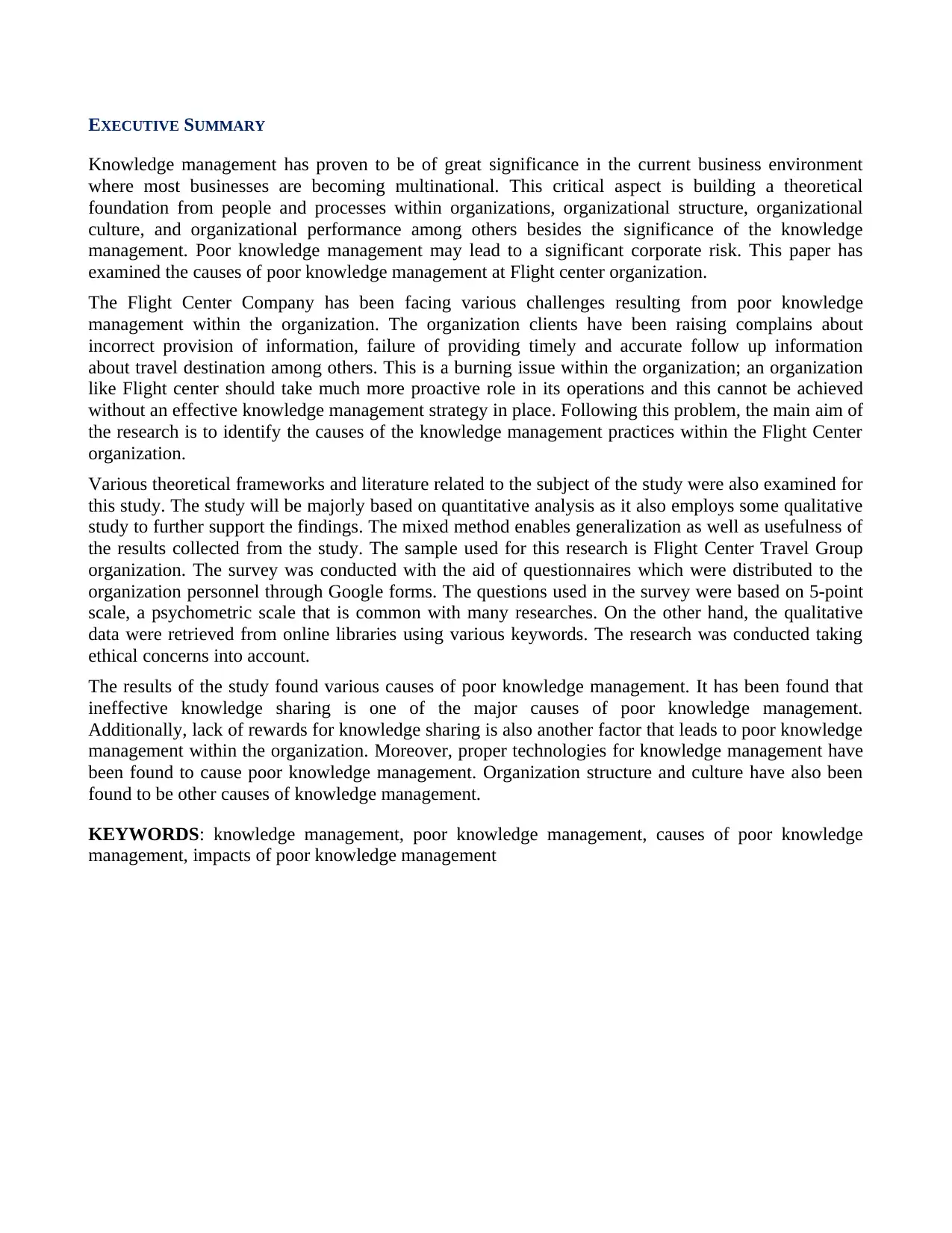
EXECUTIVE SUMMARY
Knowledge management has proven to be of great significance in the current business environment
where most businesses are becoming multinational. This critical aspect is building a theoretical
foundation from people and processes within organizations, organizational structure, organizational
culture, and organizational performance among others besides the significance of the knowledge
management. Poor knowledge management may lead to a significant corporate risk. This paper has
examined the causes of poor knowledge management at Flight center organization.
The Flight Center Company has been facing various challenges resulting from poor knowledge
management within the organization. The organization clients have been raising complains about
incorrect provision of information, failure of providing timely and accurate follow up information
about travel destination among others. This is a burning issue within the organization; an organization
like Flight center should take much more proactive role in its operations and this cannot be achieved
without an effective knowledge management strategy in place. Following this problem, the main aim of
the research is to identify the causes of the knowledge management practices within the Flight Center
organization.
Various theoretical frameworks and literature related to the subject of the study were also examined for
this study. The study will be majorly based on quantitative analysis as it also employs some qualitative
study to further support the findings. The mixed method enables generalization as well as usefulness of
the results collected from the study. The sample used for this research is Flight Center Travel Group
organization. The survey was conducted with the aid of questionnaires which were distributed to the
organization personnel through Google forms. The questions used in the survey were based on 5-point
scale, a psychometric scale that is common with many researches. On the other hand, the qualitative
data were retrieved from online libraries using various keywords. The research was conducted taking
ethical concerns into account.
The results of the study found various causes of poor knowledge management. It has been found that
ineffective knowledge sharing is one of the major causes of poor knowledge management.
Additionally, lack of rewards for knowledge sharing is also another factor that leads to poor knowledge
management within the organization. Moreover, proper technologies for knowledge management have
been found to cause poor knowledge management. Organization structure and culture have also been
found to be other causes of knowledge management.
KEYWORDS: knowledge management, poor knowledge management, causes of poor knowledge
management, impacts of poor knowledge management
Knowledge management has proven to be of great significance in the current business environment
where most businesses are becoming multinational. This critical aspect is building a theoretical
foundation from people and processes within organizations, organizational structure, organizational
culture, and organizational performance among others besides the significance of the knowledge
management. Poor knowledge management may lead to a significant corporate risk. This paper has
examined the causes of poor knowledge management at Flight center organization.
The Flight Center Company has been facing various challenges resulting from poor knowledge
management within the organization. The organization clients have been raising complains about
incorrect provision of information, failure of providing timely and accurate follow up information
about travel destination among others. This is a burning issue within the organization; an organization
like Flight center should take much more proactive role in its operations and this cannot be achieved
without an effective knowledge management strategy in place. Following this problem, the main aim of
the research is to identify the causes of the knowledge management practices within the Flight Center
organization.
Various theoretical frameworks and literature related to the subject of the study were also examined for
this study. The study will be majorly based on quantitative analysis as it also employs some qualitative
study to further support the findings. The mixed method enables generalization as well as usefulness of
the results collected from the study. The sample used for this research is Flight Center Travel Group
organization. The survey was conducted with the aid of questionnaires which were distributed to the
organization personnel through Google forms. The questions used in the survey were based on 5-point
scale, a psychometric scale that is common with many researches. On the other hand, the qualitative
data were retrieved from online libraries using various keywords. The research was conducted taking
ethical concerns into account.
The results of the study found various causes of poor knowledge management. It has been found that
ineffective knowledge sharing is one of the major causes of poor knowledge management.
Additionally, lack of rewards for knowledge sharing is also another factor that leads to poor knowledge
management within the organization. Moreover, proper technologies for knowledge management have
been found to cause poor knowledge management. Organization structure and culture have also been
found to be other causes of knowledge management.
KEYWORDS: knowledge management, poor knowledge management, causes of poor knowledge
management, impacts of poor knowledge management
⊘ This is a preview!⊘
Do you want full access?
Subscribe today to unlock all pages.

Trusted by 1+ million students worldwide
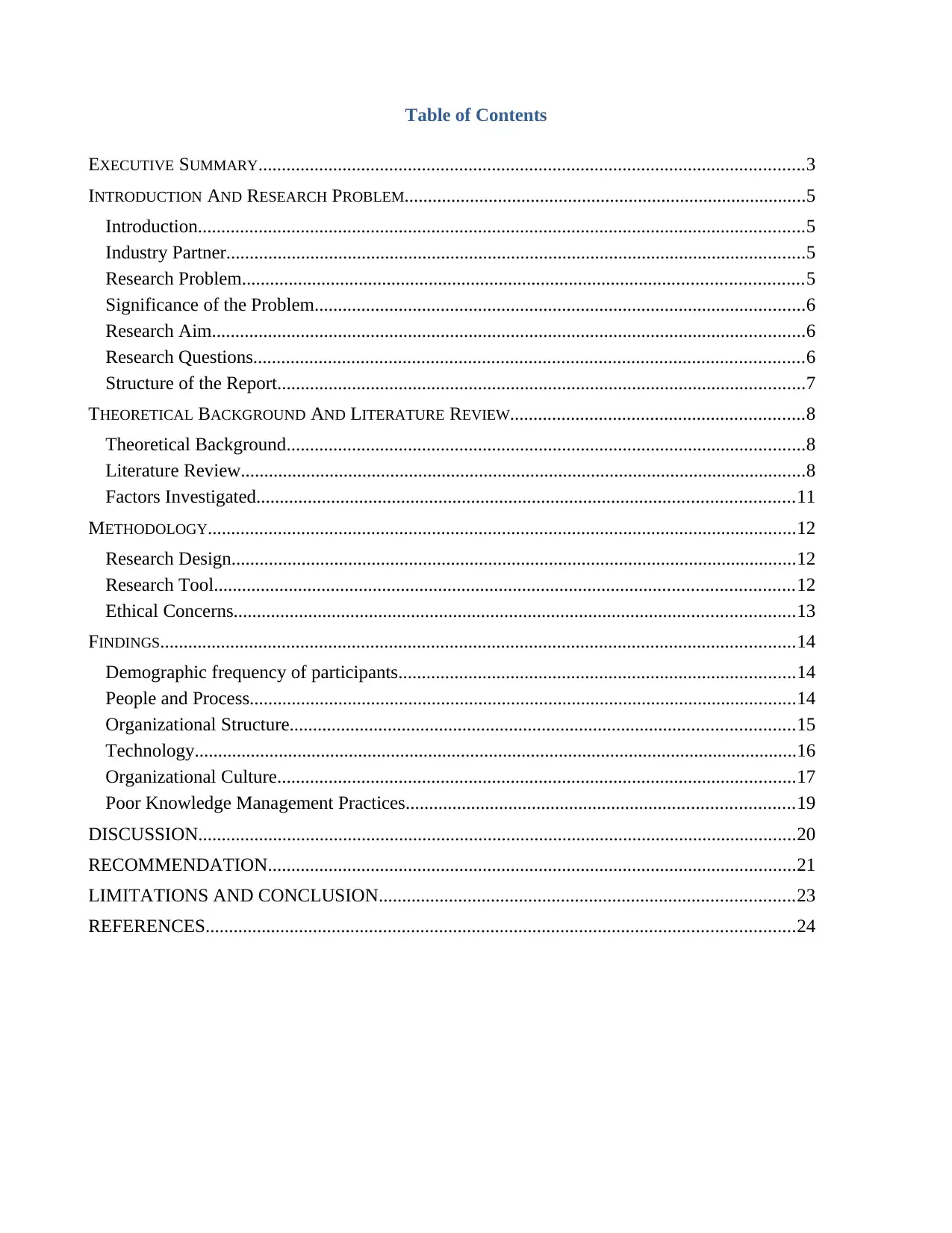
Table of Contents
EXECUTIVE SUMMARY.....................................................................................................................3
INTRODUCTION AND RESEARCH PROBLEM......................................................................................5
Introduction..................................................................................................................................5
Industry Partner............................................................................................................................5
Research Problem........................................................................................................................5
Significance of the Problem.........................................................................................................6
Research Aim...............................................................................................................................6
Research Questions......................................................................................................................6
Structure of the Report.................................................................................................................7
THEORETICAL BACKGROUND AND LITERATURE REVIEW...............................................................8
Theoretical Background...............................................................................................................8
Literature Review.........................................................................................................................8
Factors Investigated...................................................................................................................11
METHODOLOGY..............................................................................................................................12
Research Design.........................................................................................................................12
Research Tool............................................................................................................................12
Ethical Concerns........................................................................................................................13
FINDINGS........................................................................................................................................14
Demographic frequency of participants.....................................................................................14
People and Process.....................................................................................................................14
Organizational Structure............................................................................................................15
Technology.................................................................................................................................16
Organizational Culture...............................................................................................................17
Poor Knowledge Management Practices...................................................................................19
DISCUSSION................................................................................................................................20
RECOMMENDATION.................................................................................................................21
LIMITATIONS AND CONCLUSION.........................................................................................23
REFERENCES..............................................................................................................................24
EXECUTIVE SUMMARY.....................................................................................................................3
INTRODUCTION AND RESEARCH PROBLEM......................................................................................5
Introduction..................................................................................................................................5
Industry Partner............................................................................................................................5
Research Problem........................................................................................................................5
Significance of the Problem.........................................................................................................6
Research Aim...............................................................................................................................6
Research Questions......................................................................................................................6
Structure of the Report.................................................................................................................7
THEORETICAL BACKGROUND AND LITERATURE REVIEW...............................................................8
Theoretical Background...............................................................................................................8
Literature Review.........................................................................................................................8
Factors Investigated...................................................................................................................11
METHODOLOGY..............................................................................................................................12
Research Design.........................................................................................................................12
Research Tool............................................................................................................................12
Ethical Concerns........................................................................................................................13
FINDINGS........................................................................................................................................14
Demographic frequency of participants.....................................................................................14
People and Process.....................................................................................................................14
Organizational Structure............................................................................................................15
Technology.................................................................................................................................16
Organizational Culture...............................................................................................................17
Poor Knowledge Management Practices...................................................................................19
DISCUSSION................................................................................................................................20
RECOMMENDATION.................................................................................................................21
LIMITATIONS AND CONCLUSION.........................................................................................23
REFERENCES..............................................................................................................................24
Paraphrase This Document
Need a fresh take? Get an instant paraphrase of this document with our AI Paraphraser
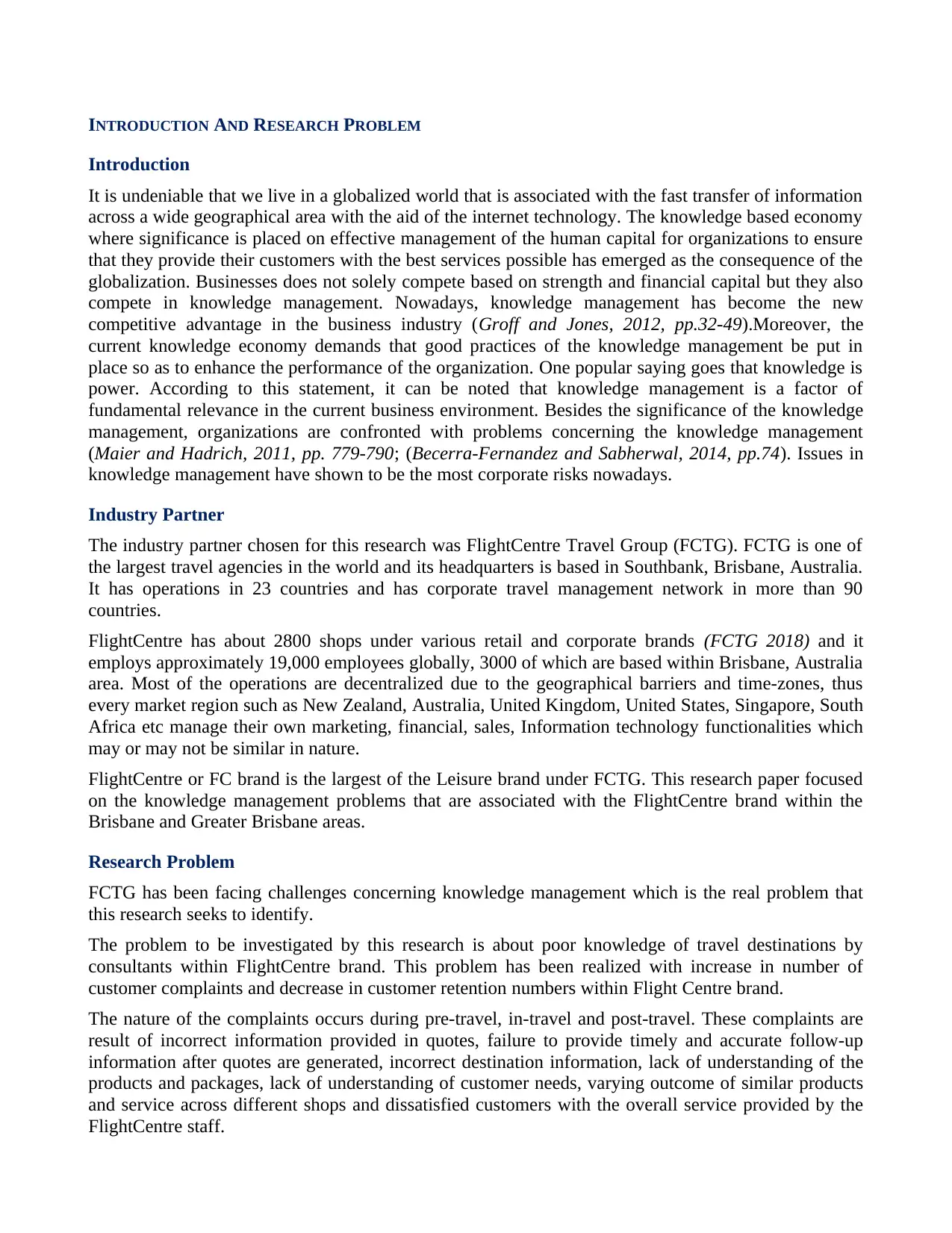
INTRODUCTION AND RESEARCH PROBLEM
Introduction
It is undeniable that we live in a globalized world that is associated with the fast transfer of information
across a wide geographical area with the aid of the internet technology. The knowledge based economy
where significance is placed on effective management of the human capital for organizations to ensure
that they provide their customers with the best services possible has emerged as the consequence of the
globalization. Businesses does not solely compete based on strength and financial capital but they also
compete in knowledge management. Nowadays, knowledge management has become the new
competitive advantage in the business industry (Groff and Jones, 2012, pp.32-49).Moreover, the
current knowledge economy demands that good practices of the knowledge management be put in
place so as to enhance the performance of the organization. One popular saying goes that knowledge is
power. According to this statement, it can be noted that knowledge management is a factor of
fundamental relevance in the current business environment. Besides the significance of the knowledge
management, organizations are confronted with problems concerning the knowledge management
(Maier and Hadrich, 2011, pp. 779-790; (Becerra-Fernandez and Sabherwal, 2014, pp.74). Issues in
knowledge management have shown to be the most corporate risks nowadays.
Industry Partner
The industry partner chosen for this research was FlightCentre Travel Group (FCTG). FCTG is one of
the largest travel agencies in the world and its headquarters is based in Southbank, Brisbane, Australia.
It has operations in 23 countries and has corporate travel management network in more than 90
countries.
FlightCentre has about 2800 shops under various retail and corporate brands (FCTG 2018) and it
employs approximately 19,000 employees globally, 3000 of which are based within Brisbane, Australia
area. Most of the operations are decentralized due to the geographical barriers and time-zones, thus
every market region such as New Zealand, Australia, United Kingdom, United States, Singapore, South
Africa etc manage their own marketing, financial, sales, Information technology functionalities which
may or may not be similar in nature.
FlightCentre or FC brand is the largest of the Leisure brand under FCTG. This research paper focused
on the knowledge management problems that are associated with the FlightCentre brand within the
Brisbane and Greater Brisbane areas.
Research Problem
FCTG has been facing challenges concerning knowledge management which is the real problem that
this research seeks to identify.
The problem to be investigated by this research is about poor knowledge of travel destinations by
consultants within FlightCentre brand. This problem has been realized with increase in number of
customer complaints and decrease in customer retention numbers within Flight Centre brand.
The nature of the complaints occurs during pre-travel, in-travel and post-travel. These complaints are
result of incorrect information provided in quotes, failure to provide timely and accurate follow-up
information after quotes are generated, incorrect destination information, lack of understanding of the
products and packages, lack of understanding of customer needs, varying outcome of similar products
and service across different shops and dissatisfied customers with the overall service provided by the
FlightCentre staff.
Introduction
It is undeniable that we live in a globalized world that is associated with the fast transfer of information
across a wide geographical area with the aid of the internet technology. The knowledge based economy
where significance is placed on effective management of the human capital for organizations to ensure
that they provide their customers with the best services possible has emerged as the consequence of the
globalization. Businesses does not solely compete based on strength and financial capital but they also
compete in knowledge management. Nowadays, knowledge management has become the new
competitive advantage in the business industry (Groff and Jones, 2012, pp.32-49).Moreover, the
current knowledge economy demands that good practices of the knowledge management be put in
place so as to enhance the performance of the organization. One popular saying goes that knowledge is
power. According to this statement, it can be noted that knowledge management is a factor of
fundamental relevance in the current business environment. Besides the significance of the knowledge
management, organizations are confronted with problems concerning the knowledge management
(Maier and Hadrich, 2011, pp. 779-790; (Becerra-Fernandez and Sabherwal, 2014, pp.74). Issues in
knowledge management have shown to be the most corporate risks nowadays.
Industry Partner
The industry partner chosen for this research was FlightCentre Travel Group (FCTG). FCTG is one of
the largest travel agencies in the world and its headquarters is based in Southbank, Brisbane, Australia.
It has operations in 23 countries and has corporate travel management network in more than 90
countries.
FlightCentre has about 2800 shops under various retail and corporate brands (FCTG 2018) and it
employs approximately 19,000 employees globally, 3000 of which are based within Brisbane, Australia
area. Most of the operations are decentralized due to the geographical barriers and time-zones, thus
every market region such as New Zealand, Australia, United Kingdom, United States, Singapore, South
Africa etc manage their own marketing, financial, sales, Information technology functionalities which
may or may not be similar in nature.
FlightCentre or FC brand is the largest of the Leisure brand under FCTG. This research paper focused
on the knowledge management problems that are associated with the FlightCentre brand within the
Brisbane and Greater Brisbane areas.
Research Problem
FCTG has been facing challenges concerning knowledge management which is the real problem that
this research seeks to identify.
The problem to be investigated by this research is about poor knowledge of travel destinations by
consultants within FlightCentre brand. This problem has been realized with increase in number of
customer complaints and decrease in customer retention numbers within Flight Centre brand.
The nature of the complaints occurs during pre-travel, in-travel and post-travel. These complaints are
result of incorrect information provided in quotes, failure to provide timely and accurate follow-up
information after quotes are generated, incorrect destination information, lack of understanding of the
products and packages, lack of understanding of customer needs, varying outcome of similar products
and service across different shops and dissatisfied customers with the overall service provided by the
FlightCentre staff.
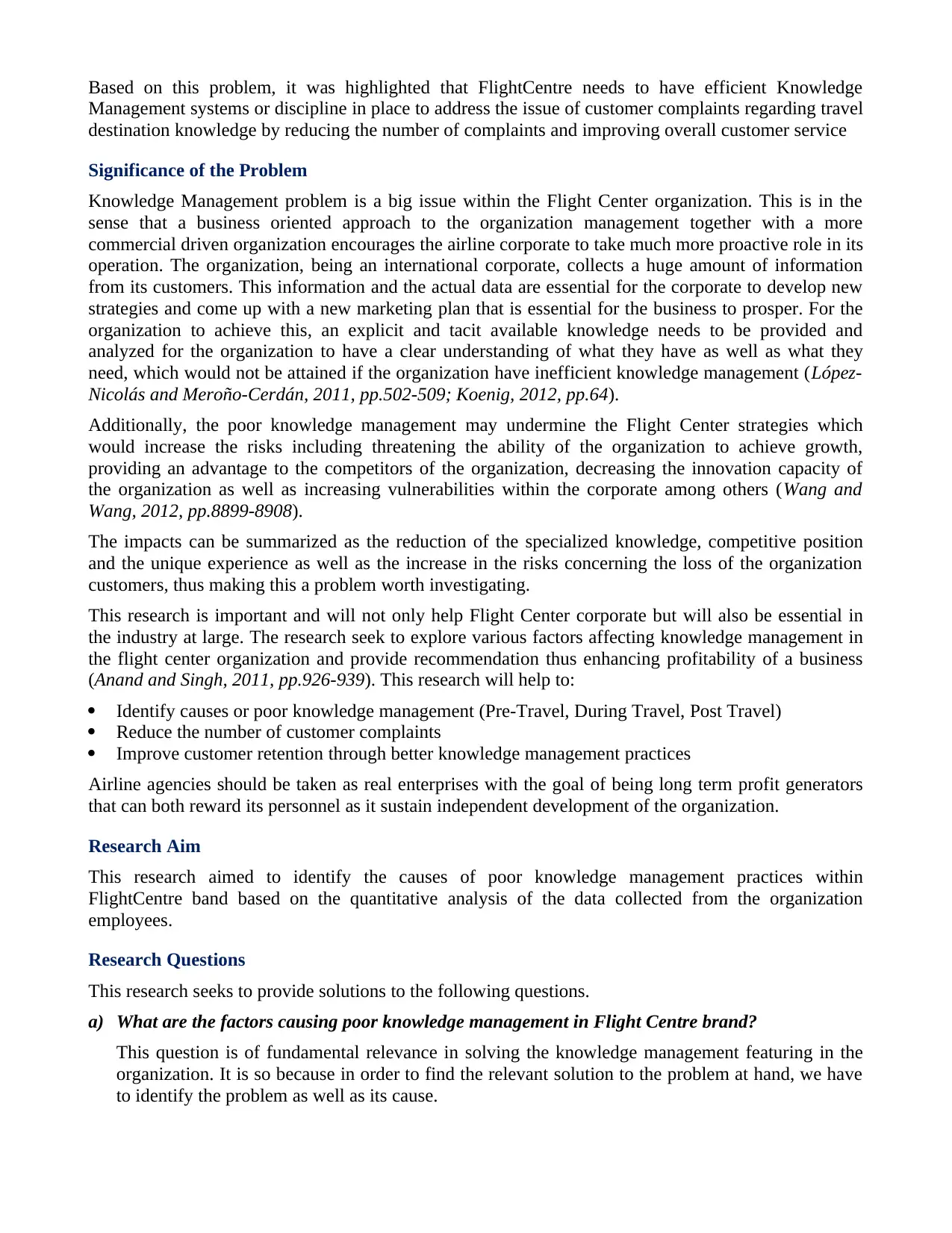
Based on this problem, it was highlighted that FlightCentre needs to have efficient Knowledge
Management systems or discipline in place to address the issue of customer complaints regarding travel
destination knowledge by reducing the number of complaints and improving overall customer service
Significance of the Problem
Knowledge Management problem is a big issue within the Flight Center organization. This is in the
sense that a business oriented approach to the organization management together with a more
commercial driven organization encourages the airline corporate to take much more proactive role in its
operation. The organization, being an international corporate, collects a huge amount of information
from its customers. This information and the actual data are essential for the corporate to develop new
strategies and come up with a new marketing plan that is essential for the business to prosper. For the
organization to achieve this, an explicit and tacit available knowledge needs to be provided and
analyzed for the organization to have a clear understanding of what they have as well as what they
need, which would not be attained if the organization have inefficient knowledge management (López-
Nicolás and Meroño-Cerdán, 2011, pp.502-509; Koenig, 2012, pp.64).
Additionally, the poor knowledge management may undermine the Flight Center strategies which
would increase the risks including threatening the ability of the organization to achieve growth,
providing an advantage to the competitors of the organization, decreasing the innovation capacity of
the organization as well as increasing vulnerabilities within the corporate among others (Wang and
Wang, 2012, pp.8899-8908).
The impacts can be summarized as the reduction of the specialized knowledge, competitive position
and the unique experience as well as the increase in the risks concerning the loss of the organization
customers, thus making this a problem worth investigating.
This research is important and will not only help Flight Center corporate but will also be essential in
the industry at large. The research seek to explore various factors affecting knowledge management in
the flight center organization and provide recommendation thus enhancing profitability of a business
(Anand and Singh, 2011, pp.926-939). This research will help to:
Identify causes or poor knowledge management (Pre-Travel, During Travel, Post Travel)
Reduce the number of customer complaints
Improve customer retention through better knowledge management practices
Airline agencies should be taken as real enterprises with the goal of being long term profit generators
that can both reward its personnel as it sustain independent development of the organization.
Research Aim
This research aimed to identify the causes of poor knowledge management practices within
FlightCentre band based on the quantitative analysis of the data collected from the organization
employees.
Research Questions
This research seeks to provide solutions to the following questions.
a) What are the factors causing poor knowledge management in Flight Centre brand?
This question is of fundamental relevance in solving the knowledge management featuring in the
organization. It is so because in order to find the relevant solution to the problem at hand, we have
to identify the problem as well as its cause.
Management systems or discipline in place to address the issue of customer complaints regarding travel
destination knowledge by reducing the number of complaints and improving overall customer service
Significance of the Problem
Knowledge Management problem is a big issue within the Flight Center organization. This is in the
sense that a business oriented approach to the organization management together with a more
commercial driven organization encourages the airline corporate to take much more proactive role in its
operation. The organization, being an international corporate, collects a huge amount of information
from its customers. This information and the actual data are essential for the corporate to develop new
strategies and come up with a new marketing plan that is essential for the business to prosper. For the
organization to achieve this, an explicit and tacit available knowledge needs to be provided and
analyzed for the organization to have a clear understanding of what they have as well as what they
need, which would not be attained if the organization have inefficient knowledge management (López-
Nicolás and Meroño-Cerdán, 2011, pp.502-509; Koenig, 2012, pp.64).
Additionally, the poor knowledge management may undermine the Flight Center strategies which
would increase the risks including threatening the ability of the organization to achieve growth,
providing an advantage to the competitors of the organization, decreasing the innovation capacity of
the organization as well as increasing vulnerabilities within the corporate among others (Wang and
Wang, 2012, pp.8899-8908).
The impacts can be summarized as the reduction of the specialized knowledge, competitive position
and the unique experience as well as the increase in the risks concerning the loss of the organization
customers, thus making this a problem worth investigating.
This research is important and will not only help Flight Center corporate but will also be essential in
the industry at large. The research seek to explore various factors affecting knowledge management in
the flight center organization and provide recommendation thus enhancing profitability of a business
(Anand and Singh, 2011, pp.926-939). This research will help to:
Identify causes or poor knowledge management (Pre-Travel, During Travel, Post Travel)
Reduce the number of customer complaints
Improve customer retention through better knowledge management practices
Airline agencies should be taken as real enterprises with the goal of being long term profit generators
that can both reward its personnel as it sustain independent development of the organization.
Research Aim
This research aimed to identify the causes of poor knowledge management practices within
FlightCentre band based on the quantitative analysis of the data collected from the organization
employees.
Research Questions
This research seeks to provide solutions to the following questions.
a) What are the factors causing poor knowledge management in Flight Centre brand?
This question is of fundamental relevance in solving the knowledge management featuring in the
organization. It is so because in order to find the relevant solution to the problem at hand, we have
to identify the problem as well as its cause.
⊘ This is a preview!⊘
Do you want full access?
Subscribe today to unlock all pages.

Trusted by 1+ million students worldwide
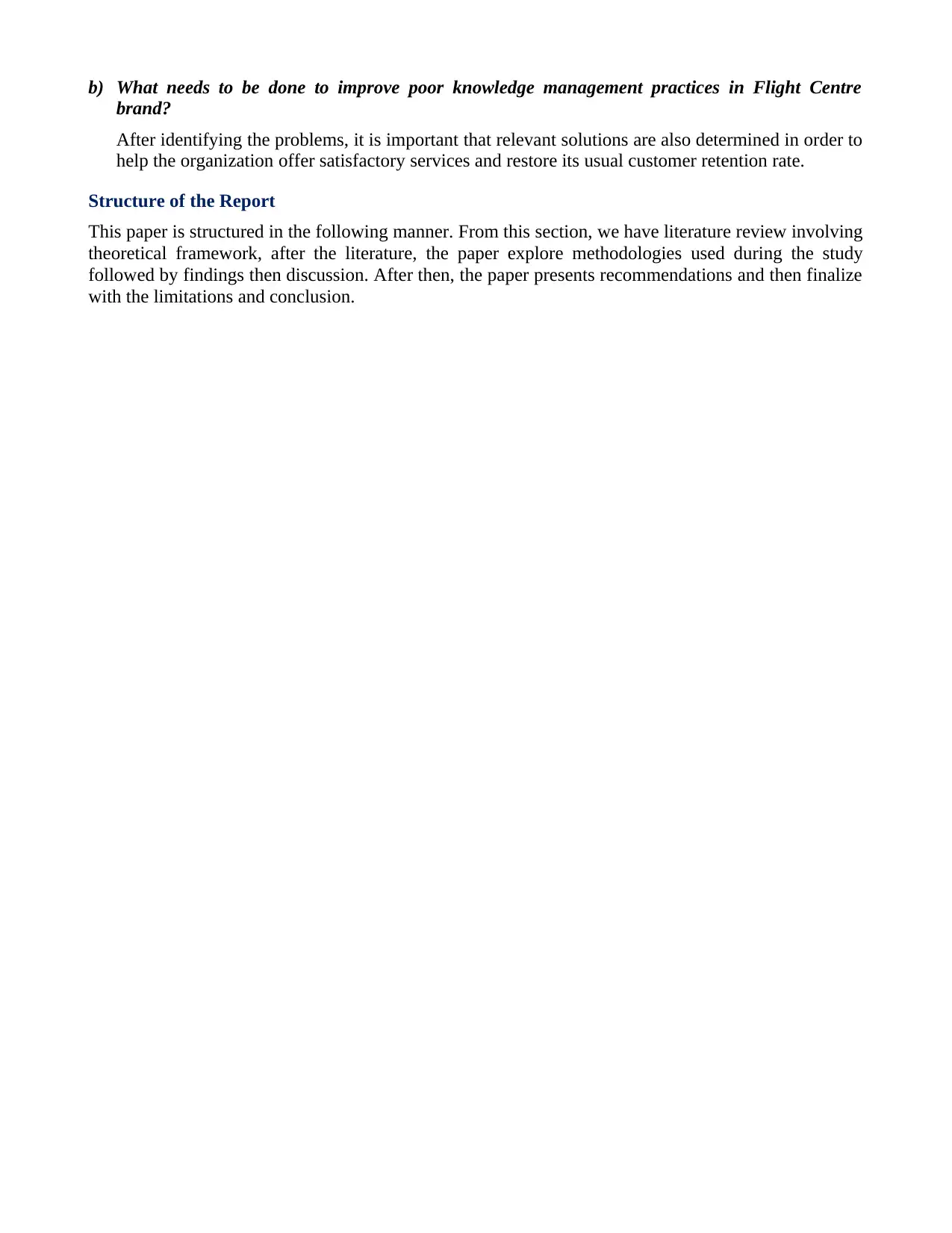
b) What needs to be done to improve poor knowledge management practices in Flight Centre
brand?
After identifying the problems, it is important that relevant solutions are also determined in order to
help the organization offer satisfactory services and restore its usual customer retention rate.
Structure of the Report
This paper is structured in the following manner. From this section, we have literature review involving
theoretical framework, after the literature, the paper explore methodologies used during the study
followed by findings then discussion. After then, the paper presents recommendations and then finalize
with the limitations and conclusion.
brand?
After identifying the problems, it is important that relevant solutions are also determined in order to
help the organization offer satisfactory services and restore its usual customer retention rate.
Structure of the Report
This paper is structured in the following manner. From this section, we have literature review involving
theoretical framework, after the literature, the paper explore methodologies used during the study
followed by findings then discussion. After then, the paper presents recommendations and then finalize
with the limitations and conclusion.
Paraphrase This Document
Need a fresh take? Get an instant paraphrase of this document with our AI Paraphraser
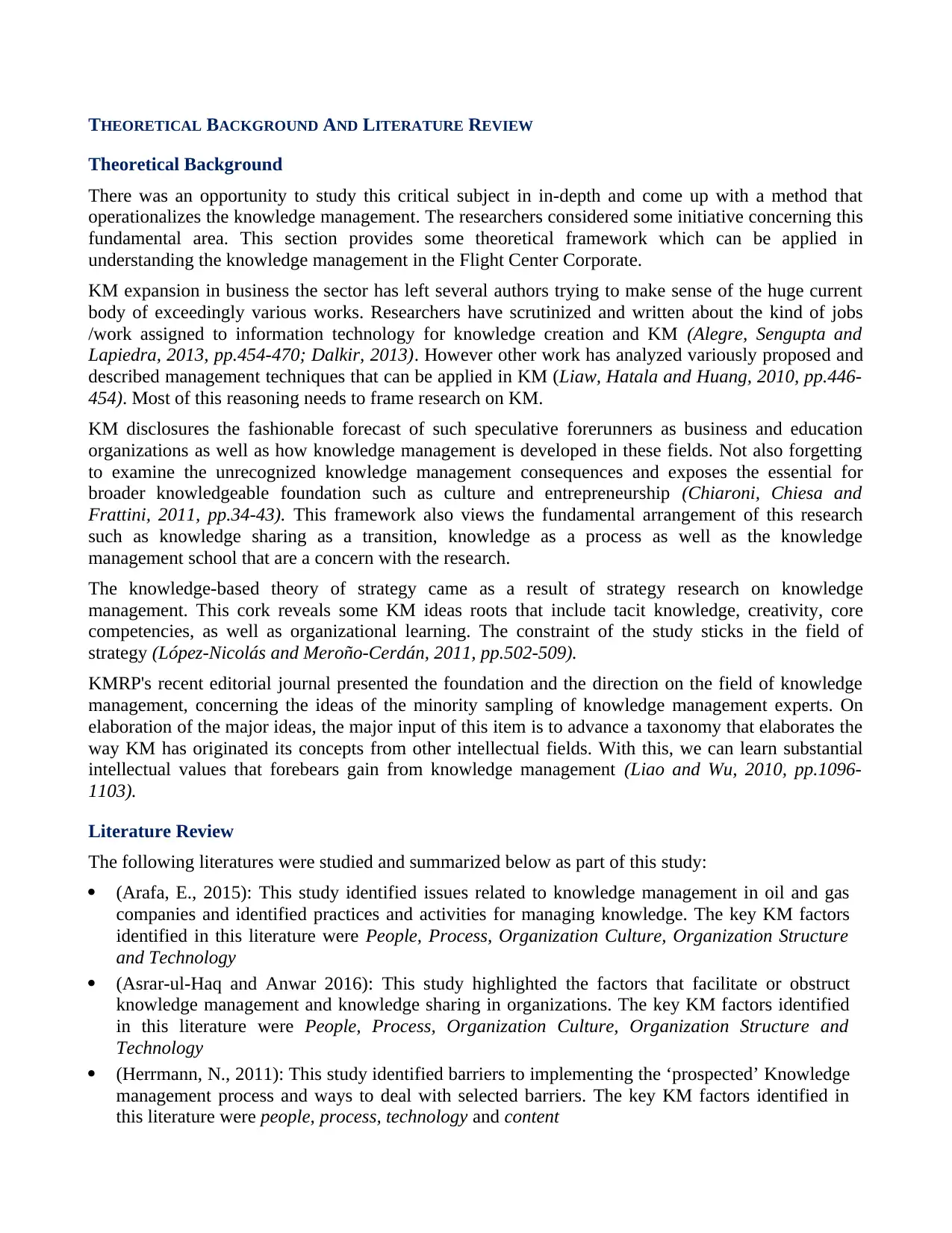
THEORETICAL BACKGROUND AND LITERATURE REVIEW
Theoretical Background
There was an opportunity to study this critical subject in in-depth and come up with a method that
operationalizes the knowledge management. The researchers considered some initiative concerning this
fundamental area. This section provides some theoretical framework which can be applied in
understanding the knowledge management in the Flight Center Corporate.
KM expansion in business the sector has left several authors trying to make sense of the huge current
body of exceedingly various works. Researchers have scrutinized and written about the kind of jobs
/work assigned to information technology for knowledge creation and KM (Alegre, Sengupta and
Lapiedra, 2013, pp.454-470; Dalkir, 2013). However other work has analyzed variously proposed and
described management techniques that can be applied in KM (Liaw, Hatala and Huang, 2010, pp.446-
454). Most of this reasoning needs to frame research on KM.
KM disclosures the fashionable forecast of such speculative forerunners as business and education
organizations as well as how knowledge management is developed in these fields. Not also forgetting
to examine the unrecognized knowledge management consequences and exposes the essential for
broader knowledgeable foundation such as culture and entrepreneurship (Chiaroni, Chiesa and
Frattini, 2011, pp.34-43). This framework also views the fundamental arrangement of this research
such as knowledge sharing as a transition, knowledge as a process as well as the knowledge
management school that are a concern with the research.
The knowledge-based theory of strategy came as a result of strategy research on knowledge
management. This cork reveals some KM ideas roots that include tacit knowledge, creativity, core
competencies, as well as organizational learning. The constraint of the study sticks in the field of
strategy (López-Nicolás and Meroño-Cerdán, 2011, pp.502-509).
KMRP's recent editorial journal presented the foundation and the direction on the field of knowledge
management, concerning the ideas of the minority sampling of knowledge management experts. On
elaboration of the major ideas, the major input of this item is to advance a taxonomy that elaborates the
way KM has originated its concepts from other intellectual fields. With this, we can learn substantial
intellectual values that forebears gain from knowledge management (Liao and Wu, 2010, pp.1096-
1103).
Literature Review
The following literatures were studied and summarized below as part of this study:
(Arafa, E., 2015): This study identified issues related to knowledge management in oil and gas
companies and identified practices and activities for managing knowledge. The key KM factors
identified in this literature were People, Process, Organization Culture, Organization Structure
and Technology
(Asrar-ul-Haq and Anwar 2016): This study highlighted the factors that facilitate or obstruct
knowledge management and knowledge sharing in organizations. The key KM factors identified
in this literature were People, Process, Organization Culture, Organization Structure and
Technology
(Herrmann, N., 2011): This study identified barriers to implementing the ‘prospected’ Knowledge
management process and ways to deal with selected barriers. The key KM factors identified in
this literature were people, process, technology and content
Theoretical Background
There was an opportunity to study this critical subject in in-depth and come up with a method that
operationalizes the knowledge management. The researchers considered some initiative concerning this
fundamental area. This section provides some theoretical framework which can be applied in
understanding the knowledge management in the Flight Center Corporate.
KM expansion in business the sector has left several authors trying to make sense of the huge current
body of exceedingly various works. Researchers have scrutinized and written about the kind of jobs
/work assigned to information technology for knowledge creation and KM (Alegre, Sengupta and
Lapiedra, 2013, pp.454-470; Dalkir, 2013). However other work has analyzed variously proposed and
described management techniques that can be applied in KM (Liaw, Hatala and Huang, 2010, pp.446-
454). Most of this reasoning needs to frame research on KM.
KM disclosures the fashionable forecast of such speculative forerunners as business and education
organizations as well as how knowledge management is developed in these fields. Not also forgetting
to examine the unrecognized knowledge management consequences and exposes the essential for
broader knowledgeable foundation such as culture and entrepreneurship (Chiaroni, Chiesa and
Frattini, 2011, pp.34-43). This framework also views the fundamental arrangement of this research
such as knowledge sharing as a transition, knowledge as a process as well as the knowledge
management school that are a concern with the research.
The knowledge-based theory of strategy came as a result of strategy research on knowledge
management. This cork reveals some KM ideas roots that include tacit knowledge, creativity, core
competencies, as well as organizational learning. The constraint of the study sticks in the field of
strategy (López-Nicolás and Meroño-Cerdán, 2011, pp.502-509).
KMRP's recent editorial journal presented the foundation and the direction on the field of knowledge
management, concerning the ideas of the minority sampling of knowledge management experts. On
elaboration of the major ideas, the major input of this item is to advance a taxonomy that elaborates the
way KM has originated its concepts from other intellectual fields. With this, we can learn substantial
intellectual values that forebears gain from knowledge management (Liao and Wu, 2010, pp.1096-
1103).
Literature Review
The following literatures were studied and summarized below as part of this study:
(Arafa, E., 2015): This study identified issues related to knowledge management in oil and gas
companies and identified practices and activities for managing knowledge. The key KM factors
identified in this literature were People, Process, Organization Culture, Organization Structure
and Technology
(Asrar-ul-Haq and Anwar 2016): This study highlighted the factors that facilitate or obstruct
knowledge management and knowledge sharing in organizations. The key KM factors identified
in this literature were People, Process, Organization Culture, Organization Structure and
Technology
(Herrmann, N., 2011): This study identified barriers to implementing the ‘prospected’ Knowledge
management process and ways to deal with selected barriers. The key KM factors identified in
this literature were people, process, technology and content
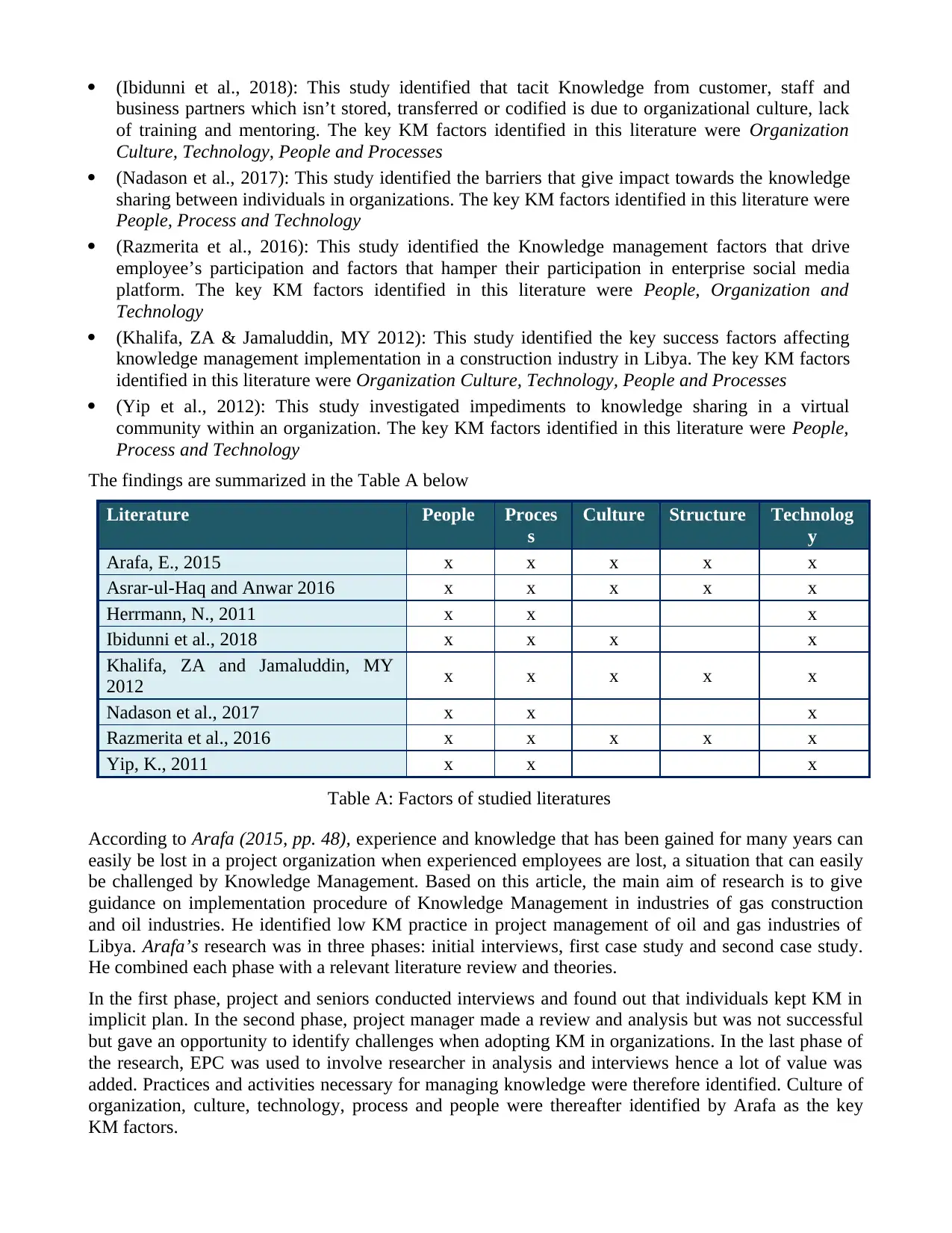
(Ibidunni et al., 2018): This study identified that tacit Knowledge from customer, staff and
business partners which isn’t stored, transferred or codified is due to organizational culture, lack
of training and mentoring. The key KM factors identified in this literature were Organization
Culture, Technology, People and Processes
(Nadason et al., 2017): This study identified the barriers that give impact towards the knowledge
sharing between individuals in organizations. The key KM factors identified in this literature were
People, Process and Technology
(Razmerita et al., 2016): This study identified the Knowledge management factors that drive
employee’s participation and factors that hamper their participation in enterprise social media
platform. The key KM factors identified in this literature were People, Organization and
Technology
(Khalifa, ZA & Jamaluddin, MY 2012): This study identified the key success factors affecting
knowledge management implementation in a construction industry in Libya. The key KM factors
identified in this literature were Organization Culture, Technology, People and Processes
(Yip et al., 2012): This study investigated impediments to knowledge sharing in a virtual
community within an organization. The key KM factors identified in this literature were People,
Process and Technology
The findings are summarized in the Table A below
Literature People Proces
s
Culture Structure Technolog
y
Arafa, E., 2015 x x x x x
Asrar-ul-Haq and Anwar 2016 x x x x x
Herrmann, N., 2011 x x x
Ibidunni et al., 2018 x x x x
Khalifa, ZA and Jamaluddin, MY
2012 x x x x x
Nadason et al., 2017 x x x
Razmerita et al., 2016 x x x x x
Yip, K., 2011 x x x
Table A: Factors of studied literatures
According to Arafa (2015, pp. 48), experience and knowledge that has been gained for many years can
easily be lost in a project organization when experienced employees are lost, a situation that can easily
be challenged by Knowledge Management. Based on this article, the main aim of research is to give
guidance on implementation procedure of Knowledge Management in industries of gas construction
and oil industries. He identified low KM practice in project management of oil and gas industries of
Libya. Arafa’s research was in three phases: initial interviews, first case study and second case study.
He combined each phase with a relevant literature review and theories.
In the first phase, project and seniors conducted interviews and found out that individuals kept KM in
implicit plan. In the second phase, project manager made a review and analysis but was not successful
but gave an opportunity to identify challenges when adopting KM in organizations. In the last phase of
the research, EPC was used to involve researcher in analysis and interviews hence a lot of value was
added. Practices and activities necessary for managing knowledge were therefore identified. Culture of
organization, culture, technology, process and people were thereafter identified by Arafa as the key
KM factors.
business partners which isn’t stored, transferred or codified is due to organizational culture, lack
of training and mentoring. The key KM factors identified in this literature were Organization
Culture, Technology, People and Processes
(Nadason et al., 2017): This study identified the barriers that give impact towards the knowledge
sharing between individuals in organizations. The key KM factors identified in this literature were
People, Process and Technology
(Razmerita et al., 2016): This study identified the Knowledge management factors that drive
employee’s participation and factors that hamper their participation in enterprise social media
platform. The key KM factors identified in this literature were People, Organization and
Technology
(Khalifa, ZA & Jamaluddin, MY 2012): This study identified the key success factors affecting
knowledge management implementation in a construction industry in Libya. The key KM factors
identified in this literature were Organization Culture, Technology, People and Processes
(Yip et al., 2012): This study investigated impediments to knowledge sharing in a virtual
community within an organization. The key KM factors identified in this literature were People,
Process and Technology
The findings are summarized in the Table A below
Literature People Proces
s
Culture Structure Technolog
y
Arafa, E., 2015 x x x x x
Asrar-ul-Haq and Anwar 2016 x x x x x
Herrmann, N., 2011 x x x
Ibidunni et al., 2018 x x x x
Khalifa, ZA and Jamaluddin, MY
2012 x x x x x
Nadason et al., 2017 x x x
Razmerita et al., 2016 x x x x x
Yip, K., 2011 x x x
Table A: Factors of studied literatures
According to Arafa (2015, pp. 48), experience and knowledge that has been gained for many years can
easily be lost in a project organization when experienced employees are lost, a situation that can easily
be challenged by Knowledge Management. Based on this article, the main aim of research is to give
guidance on implementation procedure of Knowledge Management in industries of gas construction
and oil industries. He identified low KM practice in project management of oil and gas industries of
Libya. Arafa’s research was in three phases: initial interviews, first case study and second case study.
He combined each phase with a relevant literature review and theories.
In the first phase, project and seniors conducted interviews and found out that individuals kept KM in
implicit plan. In the second phase, project manager made a review and analysis but was not successful
but gave an opportunity to identify challenges when adopting KM in organizations. In the last phase of
the research, EPC was used to involve researcher in analysis and interviews hence a lot of value was
added. Practices and activities necessary for managing knowledge were therefore identified. Culture of
organization, culture, technology, process and people were thereafter identified by Arafa as the key
KM factors.
⊘ This is a preview!⊘
Do you want full access?
Subscribe today to unlock all pages.

Trusted by 1+ million students worldwide
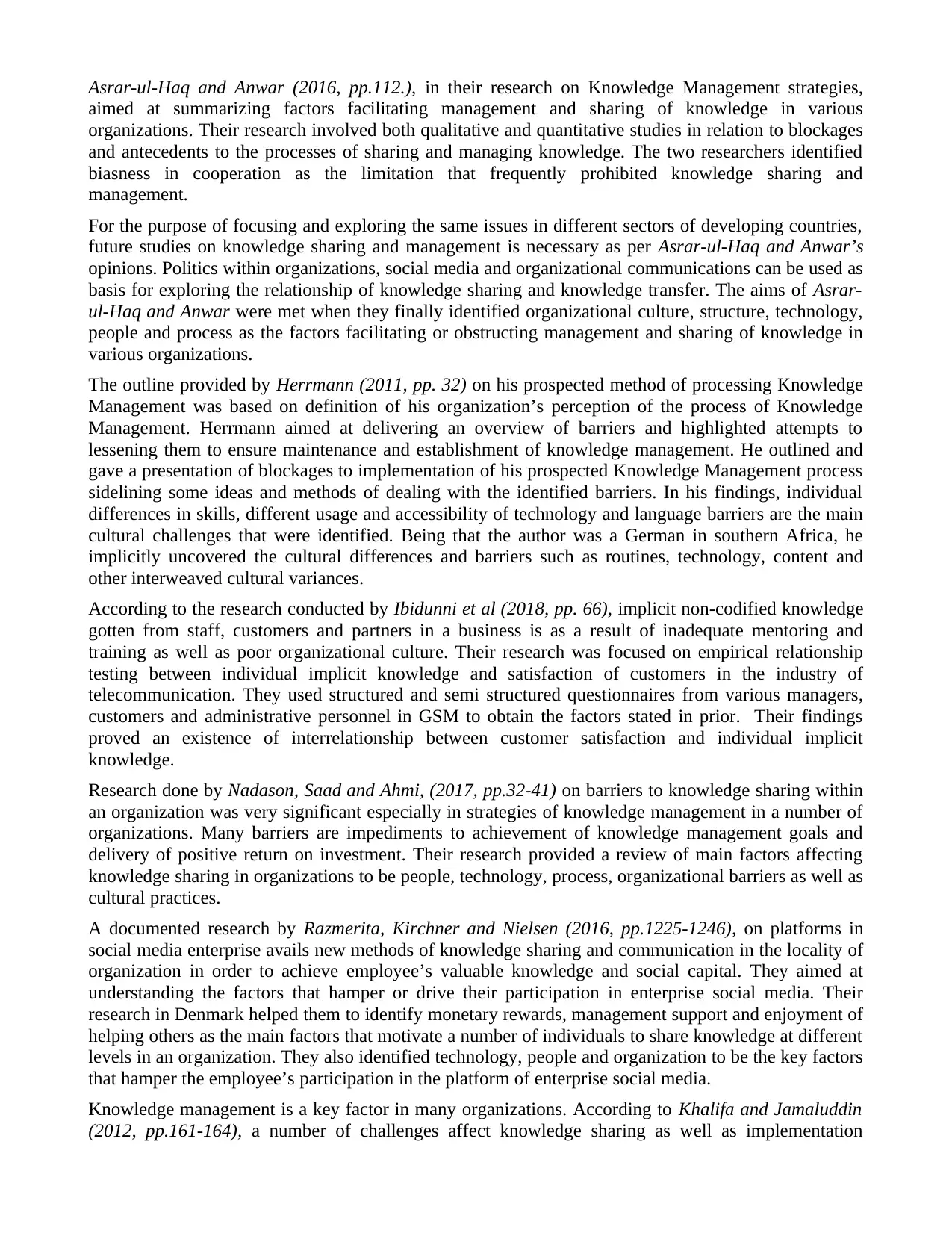
Asrar-ul-Haq and Anwar (2016, pp.112.), in their research on Knowledge Management strategies,
aimed at summarizing factors facilitating management and sharing of knowledge in various
organizations. Their research involved both qualitative and quantitative studies in relation to blockages
and antecedents to the processes of sharing and managing knowledge. The two researchers identified
biasness in cooperation as the limitation that frequently prohibited knowledge sharing and
management.
For the purpose of focusing and exploring the same issues in different sectors of developing countries,
future studies on knowledge sharing and management is necessary as per Asrar-ul-Haq and Anwar’s
opinions. Politics within organizations, social media and organizational communications can be used as
basis for exploring the relationship of knowledge sharing and knowledge transfer. The aims of Asrar-
ul-Haq and Anwar were met when they finally identified organizational culture, structure, technology,
people and process as the factors facilitating or obstructing management and sharing of knowledge in
various organizations.
The outline provided by Herrmann (2011, pp. 32) on his prospected method of processing Knowledge
Management was based on definition of his organization’s perception of the process of Knowledge
Management. Herrmann aimed at delivering an overview of barriers and highlighted attempts to
lessening them to ensure maintenance and establishment of knowledge management. He outlined and
gave a presentation of blockages to implementation of his prospected Knowledge Management process
sidelining some ideas and methods of dealing with the identified barriers. In his findings, individual
differences in skills, different usage and accessibility of technology and language barriers are the main
cultural challenges that were identified. Being that the author was a German in southern Africa, he
implicitly uncovered the cultural differences and barriers such as routines, technology, content and
other interweaved cultural variances.
According to the research conducted by Ibidunni et al (2018, pp. 66), implicit non-codified knowledge
gotten from staff, customers and partners in a business is as a result of inadequate mentoring and
training as well as poor organizational culture. Their research was focused on empirical relationship
testing between individual implicit knowledge and satisfaction of customers in the industry of
telecommunication. They used structured and semi structured questionnaires from various managers,
customers and administrative personnel in GSM to obtain the factors stated in prior. Their findings
proved an existence of interrelationship between customer satisfaction and individual implicit
knowledge.
Research done by Nadason, Saad and Ahmi, (2017, pp.32-41) on barriers to knowledge sharing within
an organization was very significant especially in strategies of knowledge management in a number of
organizations. Many barriers are impediments to achievement of knowledge management goals and
delivery of positive return on investment. Their research provided a review of main factors affecting
knowledge sharing in organizations to be people, technology, process, organizational barriers as well as
cultural practices.
A documented research by Razmerita, Kirchner and Nielsen (2016, pp.1225-1246), on platforms in
social media enterprise avails new methods of knowledge sharing and communication in the locality of
organization in order to achieve employee’s valuable knowledge and social capital. They aimed at
understanding the factors that hamper or drive their participation in enterprise social media. Their
research in Denmark helped them to identify monetary rewards, management support and enjoyment of
helping others as the main factors that motivate a number of individuals to share knowledge at different
levels in an organization. They also identified technology, people and organization to be the key factors
that hamper the employee’s participation in the platform of enterprise social media.
Knowledge management is a key factor in many organizations. According to Khalifa and Jamaluddin
(2012, pp.161-164), a number of challenges affect knowledge sharing as well as implementation
aimed at summarizing factors facilitating management and sharing of knowledge in various
organizations. Their research involved both qualitative and quantitative studies in relation to blockages
and antecedents to the processes of sharing and managing knowledge. The two researchers identified
biasness in cooperation as the limitation that frequently prohibited knowledge sharing and
management.
For the purpose of focusing and exploring the same issues in different sectors of developing countries,
future studies on knowledge sharing and management is necessary as per Asrar-ul-Haq and Anwar’s
opinions. Politics within organizations, social media and organizational communications can be used as
basis for exploring the relationship of knowledge sharing and knowledge transfer. The aims of Asrar-
ul-Haq and Anwar were met when they finally identified organizational culture, structure, technology,
people and process as the factors facilitating or obstructing management and sharing of knowledge in
various organizations.
The outline provided by Herrmann (2011, pp. 32) on his prospected method of processing Knowledge
Management was based on definition of his organization’s perception of the process of Knowledge
Management. Herrmann aimed at delivering an overview of barriers and highlighted attempts to
lessening them to ensure maintenance and establishment of knowledge management. He outlined and
gave a presentation of blockages to implementation of his prospected Knowledge Management process
sidelining some ideas and methods of dealing with the identified barriers. In his findings, individual
differences in skills, different usage and accessibility of technology and language barriers are the main
cultural challenges that were identified. Being that the author was a German in southern Africa, he
implicitly uncovered the cultural differences and barriers such as routines, technology, content and
other interweaved cultural variances.
According to the research conducted by Ibidunni et al (2018, pp. 66), implicit non-codified knowledge
gotten from staff, customers and partners in a business is as a result of inadequate mentoring and
training as well as poor organizational culture. Their research was focused on empirical relationship
testing between individual implicit knowledge and satisfaction of customers in the industry of
telecommunication. They used structured and semi structured questionnaires from various managers,
customers and administrative personnel in GSM to obtain the factors stated in prior. Their findings
proved an existence of interrelationship between customer satisfaction and individual implicit
knowledge.
Research done by Nadason, Saad and Ahmi, (2017, pp.32-41) on barriers to knowledge sharing within
an organization was very significant especially in strategies of knowledge management in a number of
organizations. Many barriers are impediments to achievement of knowledge management goals and
delivery of positive return on investment. Their research provided a review of main factors affecting
knowledge sharing in organizations to be people, technology, process, organizational barriers as well as
cultural practices.
A documented research by Razmerita, Kirchner and Nielsen (2016, pp.1225-1246), on platforms in
social media enterprise avails new methods of knowledge sharing and communication in the locality of
organization in order to achieve employee’s valuable knowledge and social capital. They aimed at
understanding the factors that hamper or drive their participation in enterprise social media. Their
research in Denmark helped them to identify monetary rewards, management support and enjoyment of
helping others as the main factors that motivate a number of individuals to share knowledge at different
levels in an organization. They also identified technology, people and organization to be the key factors
that hamper the employee’s participation in the platform of enterprise social media.
Knowledge management is a key factor in many organizations. According to Khalifa and Jamaluddin
(2012, pp.161-164), a number of challenges affect knowledge sharing as well as implementation
Paraphrase This Document
Need a fresh take? Get an instant paraphrase of this document with our AI Paraphraser
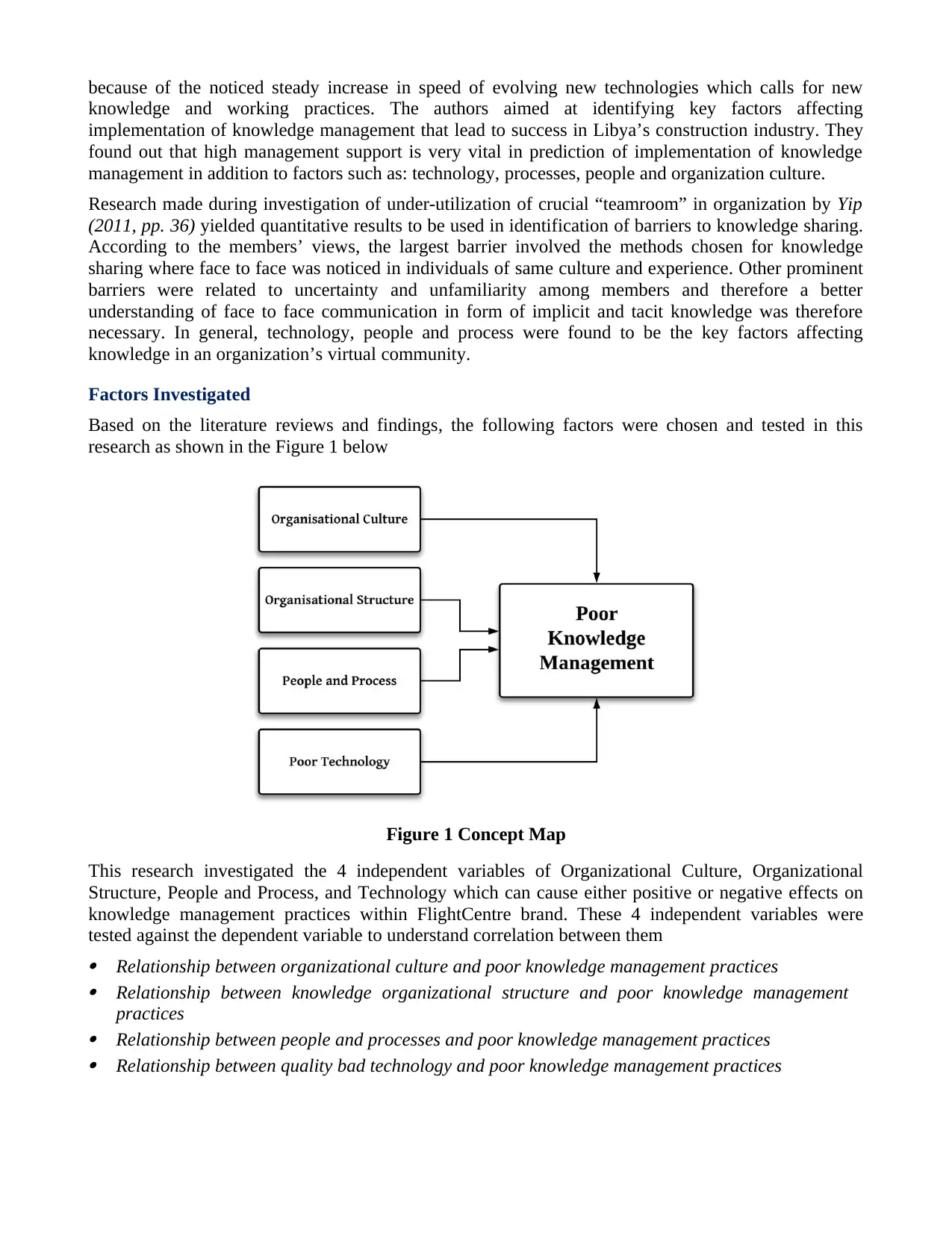
because of the noticed steady increase in speed of evolving new technologies which calls for new
knowledge and working practices. The authors aimed at identifying key factors affecting
implementation of knowledge management that lead to success in Libya’s construction industry. They
found out that high management support is very vital in prediction of implementation of knowledge
management in addition to factors such as: technology, processes, people and organization culture.
Research made during investigation of under-utilization of crucial “teamroom” in organization by Yip
(2011, pp. 36) yielded quantitative results to be used in identification of barriers to knowledge sharing.
According to the members’ views, the largest barrier involved the methods chosen for knowledge
sharing where face to face was noticed in individuals of same culture and experience. Other prominent
barriers were related to uncertainty and unfamiliarity among members and therefore a better
understanding of face to face communication in form of implicit and tacit knowledge was therefore
necessary. In general, technology, people and process were found to be the key factors affecting
knowledge in an organization’s virtual community.
Factors Investigated
Based on the literature reviews and findings, the following factors were chosen and tested in this
research as shown in the Figure 1 below
Figure 1 Concept Map
This research investigated the 4 independent variables of Organizational Culture, Organizational
Structure, People and Process, and Technology which can cause either positive or negative effects on
knowledge management practices within FlightCentre brand. These 4 independent variables were
tested against the dependent variable to understand correlation between them Relationship between organizational culture and poor knowledge management practices Relationship between knowledge organizational structure and poor knowledge management
practices Relationship between people and processes and poor knowledge management practices Relationship between quality bad technology and poor knowledge management practices
knowledge and working practices. The authors aimed at identifying key factors affecting
implementation of knowledge management that lead to success in Libya’s construction industry. They
found out that high management support is very vital in prediction of implementation of knowledge
management in addition to factors such as: technology, processes, people and organization culture.
Research made during investigation of under-utilization of crucial “teamroom” in organization by Yip
(2011, pp. 36) yielded quantitative results to be used in identification of barriers to knowledge sharing.
According to the members’ views, the largest barrier involved the methods chosen for knowledge
sharing where face to face was noticed in individuals of same culture and experience. Other prominent
barriers were related to uncertainty and unfamiliarity among members and therefore a better
understanding of face to face communication in form of implicit and tacit knowledge was therefore
necessary. In general, technology, people and process were found to be the key factors affecting
knowledge in an organization’s virtual community.
Factors Investigated
Based on the literature reviews and findings, the following factors were chosen and tested in this
research as shown in the Figure 1 below
Figure 1 Concept Map
This research investigated the 4 independent variables of Organizational Culture, Organizational
Structure, People and Process, and Technology which can cause either positive or negative effects on
knowledge management practices within FlightCentre brand. These 4 independent variables were
tested against the dependent variable to understand correlation between them Relationship between organizational culture and poor knowledge management practices Relationship between knowledge organizational structure and poor knowledge management
practices Relationship between people and processes and poor knowledge management practices Relationship between quality bad technology and poor knowledge management practices

⊘ This is a preview!⊘
Do you want full access?
Subscribe today to unlock all pages.

Trusted by 1+ million students worldwide
1 out of 29
Related Documents
Your All-in-One AI-Powered Toolkit for Academic Success.
+13062052269
info@desklib.com
Available 24*7 on WhatsApp / Email
![[object Object]](/_next/static/media/star-bottom.7253800d.svg)
Unlock your academic potential
Copyright © 2020–2025 A2Z Services. All Rights Reserved. Developed and managed by ZUCOL.


